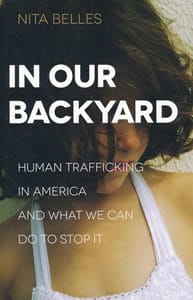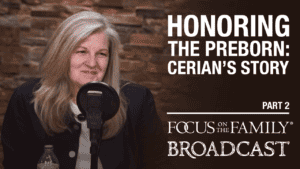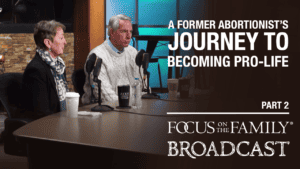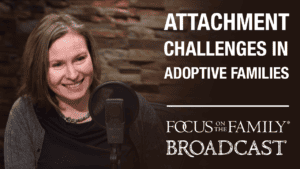Opening:
Excerpt:
Nita Belles: We live in an area where there are cougars, and so in the spring we have a warning how to respond to cougars, because if we don’t respond that way, they will eat us. And that’s what we … the way we have to look at these predators for our children. We’ve got to protect our children from the predators so they’re not trafficked.
End of Excerpt
John Fuller: Nita Belles is our guest on Focus on the Family. I’m John Fuller, and your host is Focus president and author Jim Daly.
Jim Daly: John, with SuperBowl Sunday in just a couple of days, we wanted to bring back this program on human trafficking with Nita Belles. While most of us are at home watching the SuperBowl on our televisions, the big game actually draws a lot of sex trafficking to the surrounding area that hosts the game. Nita talks more about that on our website.
Let me say upfront that this program is covering a very difficult topic, so it may be best for little ones to be distracted elsewhere.But it’s a significant discussion for us to have because this is an issue that affects families right in your neighborhood. And education is power for you and your children. If you’re unable to listen right now, come back later to our website or download the broadcast app for your smartphone and listen that way.
John: Yeah, you can do so at focusonthefamily.com/radio. And we received a lot of response from our listeners about this conversation when we last aired it. This was one of our Best of 2017 programs, in fact. It is such an important topic.
Jim: It is, John, and I think you’ll be surprised by the scope of human trafficking. It caught me by surprise. We want to broaden your awareness of the issue and provide you with practical ways you can take action against this horrific crime. Human trafficking- it’s demeaning, it’s abusive and sometimes deadly. And it’s time to put a stop to it. That’s why we spoke with human trafficking expert and author, Nita Belles. She’s been on the ground with both victims and perpetrators and she’ll equip us to know what we can do and what signs to look for.
John: And Nita isthe executive director of In Our Backyard, which is a non-profit organization linking arms across the country to fight human trafficking. And she wrote a book and entitled it,In Our Backyard, and here now is that Best of 2017 conversation.
Body:
Jim: Now I heard the statistic, and I’d like to state this one or have you reinforce it. Something like 100,000 kids are taken into human trafficking every year here in the US alone. Is that accurate?
Nita: You know, it’s hard to know what’s accurate. Those of us who work in this movement think that’s a really low number.
Jim: Reallylownumber.
Nita: Yeah, it’s–
Jim: That’s stunning.
Nita: Yeah, it’s … it’s hard to get those stats, because how do you get them? How do you get people to raise their hands and say, “Count me”? But yes, it’s very prevalent, both the sex trafficking and labor trafficking, both children and adults.
Jim: Yeah. When you look at the definition of human trafficking, for those that aren’t in this day to day like you and others that we’ve had on the program, what does human trafficking, what is the definition of human trafficking?
Nita: Human trafficking involves force, fraud, or coercion, whether it’s labor trafficking or sex trafficking. It’s somebody that comes along and pretends that they are going to do something nice for you. It’s not the kidnapping thing that we often hear about. That happens; that’s a small, small fraction of the cases; but a lot of times it’s somebody that comes along, they woo them, they trick them, and the next thing you know, they don’t have choices, and that can be labor or sex trafficking. The large majority of sex trafficking victims are American-born citizens. The large majority of labor trafficking victims are going to be foreign-born nationals.
Jim: That’s just how it sorts out. But still, 100,000 a year in the sex trafficking area alone, you believe, is a low number.
Nita: I think so.
Jim: That really bugs me.
Nita: Yes.
Jim: I’m sorry, but that, for Christian men, for Christian people, we should be on this. And I know many organizations are, and it’s one of the reasons we want to talk about it today, because so often we don’t talk about these things because it’s not ‘polite.’ But the enemy of our soul is doing damage to these children. Speak to that alluring tactic that they use. Give us an example of how these human traffickers would lure a boy or girl in the United States into their clutches.
Nita: Okay. Well, the first chapter in my book I talk about a girl we call “Sarah.” And Sarah came from a Christian home; her mom and dad were still married, had a great familyand Sarah was a straight-Astudent. This girl met her in one of her classes and began to look for opportunities to woo Sarah.Within three months of the time Sarah met Maggie at school, Maggie had introduced her to the trafficker, which Sarah didn’t know that’s what he was, and he came on to her about what a beautiful young girl she was, how he’d never felt the way he felt about anyone else–
Jim: So all the things a young girl would want to hear.
Nita: Yeah.
Jim: Thinking romantically.
Nita: “You’re the most beautiful thing I’ve ever seen,” yeah. And so Sarah fell for the young—well, he was older, he was in his 20s, she was 16—and within three months of the time he met her, she was gone missing.
Jim: My goodness. Now what people don’t understand is that elaborate network that these traffickers will create. Maggie was probably … was being paid to recruit.
Nita:Maggie was what we call a “bottom.”So within the group of girls that a trafficker traffics, we call that a “stable.” That’s what it’s called in the life. It’s called “the life.” And so each of those girls are vying to be his favorite. The one that is the most loyal to him is the one that ends up with the title “bottom,” and so she is the bottom—and there’s more to that name, but obviously we’re not going to say that today—so the bottom then has a second-in-control to what the trafficker does, and so she gets to recruit, which is what Maggie was doing; she gets to punish if they don’t obey the–
Jim: Rules.
Nita: –expectations, the rules. She gets to collect all the money. The trafficker gets 100 percent of the money, and she also has to do dates herself. And so the bottom was at school recruiting Sarah, and within three months of the time Sarah met the bottom, she went missing. That was her job, the bottom.
Jim: Has she ever reappeared?
Nita: Oh yes, that’s the good news. Not that it’s a good news story, but it’s better than the majority of stories. About a year later there was a bust of a brothel in Las Vegas, and Sarah was recovered, and thankfully, wanted to get out, because that’s not always the case; they are traumatically bonded to that captor; but Sarah wanted out, and her parents never quit looking for her. Law enforcement called her parents and said, “We’ve got Sarah.” They came and saw her.
Jim: How old was she then?
Nita: She was 17.
Jim: Wow.
Nita: Yeah. She didn’t even want to see her parents because the trafficker had so convinced her that her parents didn’t love her and that he was the only one that loved her.
Jim: Brainwashing, basically.
Nita: Brainwashing, exactly. Stockholm syndrome. Yeah.
Jim: Let me ask you. Given the nature of all this, and there’s a grimace on my face, what drew you to get involved in this area of human trafficking?
Nita: When I began working on my master’s degree, I’d done a lot of work in domestic violence, and I began, it was a natural crossover to study human trafficking. And when I saw the extreme horrific nature of human trafficking, it was worse than any domestic violence case I’d ever seen, and I said, “God, I have to do something. What do you want me to do?” And the answer surprised me. I had never been one of these people who wanted to write a book, but that’s what God told me to do.
Jim: One of the things that people don’t realize is, I know talking with others who do rescue or who engage in this area, they often are threatened, because this is a big industry.
Nita: Yeah.
Jim: And that’s something that people who engage in this on the good side have to be aware of. It’s something that, you know, you have to deal with. Is that … how do you manage that emotionally that you’re putting yourself and your family at risk?
Nita: Well, I do everything I can to minimize that, and then we trust the Lord, because my family knows I’m called to this and they help. My husband’s amazing in what he does. I sometimes feel bad that I get the credit because he does so much work.
Jim: You must see such a bifurcation of humanity, because your Christian experience, being at church with your friends, being part of a Bible study—I don’t know all that your spiritual side expresses in this life—but there’s that good side of having good neighbors, having good friends, spending the evening with friends, and then this horrific side, seeing humanity, people treat each other in a way that is so contrary to the laws and principles of God, that we’re all made in His image. And to see people sold in this way, for their body, for their labor, how do you manage that continuum of emotion?
Nita: You know when I first got into this, I was angry with the traffickers, whether it was a labor trafficker, which is every bit as horrific as sex trafficking, or a sex trafficker. And I was like, you know, I want to just do something. And God gave me a different view. Because God loves those traffickers every bit as much as God loves you and me.
Jim: You know I’ve got to say– I understand that… I struggle with that.
Nita: Yeah.
Jim: I think a lot of us Christian men would say, “Really? We should go knock ‘em in the head.”
Nita: And that being said,what I have to say to some Christians who feel like, you know, how could we be mad at them? We’re not mad at them, but we can never forget who is the perpetrator and who is the victim and we’ve got to act in that understanding. And that’s the justice of God. God doesn’t … God allows us to reap what we sow, and so those traffickers need to reap what they’re sowing.
Jim: Well, I applaud you for that spiritual attitude, and I want to be there. I don’t know how you feel.
John: I’m really, really bothered by thinking about it.
Jim: You know and I have two boys. If I had girls, I think my thermometer would be even higher on this. You have girls, John.
John: Yeah, there’s a protective element for, you know, that God wires into most men. Unfortunately, some guys just go so sideways because the enemy gets them. But yeah, there’s a justice element to this stuff that is compelling and very hard not to think of in this situation in those terms.
Jim:Absolutely. Nita, so many people that don’t perhaps have a view of God, you know they’re buying into science and evolution and those kinds of things, when you hear this argument that evil is a construct of human imagination; there is no real good and evil; yet you have a foot in both camps; you see true evil; how would you respond to that person who tries to rationalize evil away?
Nita: You know I don’t think I would respond to them, because you know I think that what I would say is love, you know. We’ve got to love, above all else. First Corinthians 13. We’ve got to love. And somebody who rationalizes evil away isn’t going to listen to me anyway, and so my job is to love them, just like–
Jim: Demonstrate.
Nita: Yeah, demonstrate that love.
Jim: Yeah. Let’s move toward the labor side of this, because that’s really not talked about very often. Sex trafficking has this compelling emotional—rightly—energy to it that you don’t want innocent children to be violated in that way. Talk about– you said for the most part foreign-born boys and girls that will be taken into servitude. Describe that. And that is happening here in the US.
Nita: That is happening here in the US. And you just said something really important, and that is that people don’t want to talk about it. That is all the traffickers ask of us is that we not talk about this. That’s all they ask.
Jim: Just leave us alone.
Nita: Just if we are just silent on this issue, they can go forward and do whatever they want. That’s all they ask. So thank you, Focus on the Family, for talking about this. The children that are trafficked in labor trafficking, it is every bit as horrific. I’ve had especially Christians say to me, “But that’s not as bad as sex trafficking.” I can’t look in the eye of people that I know that have been labor trafficked and say to them, “What happened to you wasn’t as bad as what happened to them,” because it’s every bit as bad. And don’t think that it’s just they work too hard. There’s horrific things that happen to those that are labor trafficked.
Jim: Well describe Quin’s story as an example. You use that in the book. What was Quin’s story, and where was she from?
Nita: Well, she was from Vietnam, and she was lured into American Samoa by a company that promised her—they showed her pictures of this resort with the beautiful swimming pool and all of that. Her family scraped together $5,000 so they could send her there, and she was going to send money back. But when she got there, that swimming pool was green with slime, and she was kept locked up and worked the clock around with very little rest. And she was spunky and so when somebody hurt her or somebody that she cared about, she told them about it. She lost an eye. She was hit in the face with a PVC pipe and lost an eye.
Jim: By her controller.
Nita: By her controller, yeah. And by the grace of God, she got out.
Jim: Describe—I mean again for those of us that aren’t familiar with this world, what does that mean, “labor trafficking”? What was she doing? What was she expected to do?
Nita: So she was sewing, and she was expected to do that for 12, 14 hours a day. Her hands were horrifically, permanently damaged. She had several surgeries to try to fix her hands. That’s how … and still was required to work with beatings if she didn’t–
Jim: Produce.
Nita: –produce, yes.
Jim: That’s amazing. Did she finally escape that American Samoa?
Nita: Yes, she finally got out. Finally somebody blew the whistle and she got out and she’s alive and well and has a beautiful family.
Jim: And in this case, I think she was making clothing for an American company.
Nita: Yes.
Jim: How do we educate ourselves about this and what can we do?
Nita: And the reason for placing that factory in American Samoa was so that they could put the “Made in USA” label. So a lot of us thought we could just buy “Made in USA” and it was fine, but that’s not always the case. And so what we can do is to begin to talk about it more and more. Talk to our suppliers. Get behind legislation that not only fights sex trafficking, which is incredibly important, but labor trafficking as well.
John: You’d think we’d have this behind us, but we don’t, and as disturbing as this is, as Nita just referenced, we have to talk about this and shine the light on the darkness. And one thing you can do is get a copy of Nita’s book,In Our Backyard, or a CD of this conversation. Share it with a friend. Start educating yourself. And the starting point for you is going to be to stop by atfocusonthefamily.com/radio, or to call us 1-800-232-6459, and request Nita’s book,In Our Backyard.
Jim: Nita, let me ask you this. What do you hope people will do when they hear this broadcast, when they perhaps pick up the book and they read it? What do you want them to do? Because it feels like a tsunami; it feels overwhelming. What can I do?
Nita: It is a tsunami. Everyone can do something, though. The first thing I would ask you to do is tell three people about this broadcast. Tell three people what you heard. The second thing is, as you read the book; ask God what are you supposed to do? And God might surprise you like God surprised me with the answer. But everyone can do something. The third thing I would say is everyone that is carrying a cell phone, which is almost 100 percent of us now, put the National Human Trafficking Hotline in that cell phone. If you see something or even if you have a question, call that number 24/7. It has every single language on the planet to be able to help someone.
Jim: Nita, you talked about a person named Chorito and their story. What took place with her?
Nita: So Chorito was a wonderful young woman who had excelled as far as she could in her country as a master chef, and so what do you do when that happens? Well, the American recruiter came in and said, “How would you like to move to America, the land of … the land of plenty, and we’ll advance you from there?” And so she agreed. And when she got there, they took her passport, they made her sign a contract with an exit fee, so she now had come here and now to get away from these people who had, quote, “hired her,” she had to pay a fee to get out. They moved her the next day down to the city where she was going to be working and worked her from about 9:00 in the morning until about 11 o’clock at night.
She was horrifically treated. She was berated by both of the owners. The owners were a husband and wife.She was having problems with her hands and her arms again because she was doing the repetitive motion so much. So she went to the doctor and they gave her some help, but that meant that the traffickers made her work all the harder.
Jim: My goodness. And did the labor bureau get involved, or how did that get resolved?
Nita: Finally, yeah, somebody called the human trafficking, the US Marshal over human trafficking in Oregon, and he stepped in and Chorito today is free and doing marvelously. She’s working and she has a job that she is so grateful for her employer.
Jim: Man, again, how could you have intervened there? I mean it sounds like that one patron could sense something was going on.
Nita: Right.
Jim: But it’s—are we supposed to go into every restaurant and start asking questions, or, you know, that can be a little odd.
Nita: Yeah. Good question. So I asked her that, andshe said—”Watch, and if you see something that’s bad, call the National Human Trafficking Hotline.” So that is what we can do. We want to never intervene with a trafficking situation as regular citizens, because they are being watched 100 percent of the time.
Jim: Nita, we have used examples where things have turned out, the good side, the saving of that individual. Tiffany Mason is an example of someone where the story did not end well, and it, as you said in your book, it does rip your heart out. Tell us Tiffany’s story.
Nita: Yeah.Tiffany was 13 years old when she was given back to her mother. Her and her twin brother, William, had been taken from her, their mother, when they were young because she was using drugs, and when they were given back to their mother, she was in the Tenderloin District in San Francisco, which is horrific. My husband and I went to that same building where Tiffany was taken and given back to her mother just a couple of years ago, and there were still traffickers, pimps, standing out in front of the building, talking to us as we came in.
Jim: My goodness.
Nita: And so Tiffany didn’t have a chance. When she was given back to her mother, within a month she was trafficked. And her mother saw what was going on, and she moved her to another county. Unfortunately, Child Protective Services didn’t understand the need for Tiffany to be relocated, and they brought her back and put her in another foster home close to, within ten minutes, of where Tiffany’s trafficker was.
Jim: And she’s 13 at this time.
Nita: She’s 13. And she was trafficked by that trafficker and actually another one for almost two years, and sadly, she was found dead, floating in a lake near Sacramento. I was talking to actually an ex-pimp about this very story one day, and he said, “You don’t know how many of these girls are killed, and the traffickers aren’t going to tell, because they’re going to be implemented [sic] as the person that did it, and the families, the children have been away from the families so long that the families don’t know she’s really gone.”
And so that’s why we’ve got to talk about it; that’s why I thank you for bringing me here to talk about it, because we can make a change. As Christians, wemustmake a change. Wemustcare about these children.
Jim: Nita, as we’re wrapping up here, I want to make sure people walk away after listening to this knowing the signs of their own children, of their children’s friends. So often that’s what’s happened is a wise parent who is equipped to know the signs will recognize them in their children’s friends, and that’s the clue. I’ve heard several times where that has been the way children particularly have been saved from human trafficking.
Nita: Right.
Jim: What are those signs, and what do we need to look for?
Nita: Sothose signs are a different kind of behavior in your child. Like Sarah that we talked about at first. She all of a sudden wasn’t interested in youth group; she wasn’t interested in hanging out with the friends that she had been hanging out with. You need to check their stories. You know, we need to keep, most importantly, we need to keep today an eye on their electronics. Know that cell phone. I recommend that the cell phones go in the parents’ room at night to be charged, and then the parents need to have all the passwords of those devices, and check. Because our children are prey to these predators.
I like to use a story,we live in an area where there are cougars, and so in the spring we have a warning how to respond to cougars, because if we don’t respond that way, they will eat us. And that’s what we … the way we have to look at these predators for our children. We’ve got to protect our children from the predators so they’re not trafficked.
Jim: Nita, you’ve mentioned some behavioral changes to be observant about. Some of those can be normal–
Nita: Exactly.
Jim: –so it’s really tricky. What are some of those other things that we need to be in tune with?
Nita: I’m going to recommend that they go to our website, and we have a whole page there for parents to look how to keep their children safe from traffickers, and that would be better than the few things I could tell you.
John: And we’ll have that link atfocusonthefamily.com/radio.
Jim: Nita, this has been enlightening, disturbing, frustrating, all those emotions I can feel, and I don’t know why this topic particularly, but it just stirs me up because it’s something that is egregious. As I said at the top of the hour, we’re all made in God’s image. When you have particularly adults treating children like that—I know it affects young adults as well—but just people preying on each other and we think this is normal, I mean that is terrible.
Nita: It is terrible.
Jim: And it’s not the way God intended for people to live–
Nita: Absolutely not.
Jim: –and it’s not His heart for anyone, as you mentioned so well. I appreciate what you do. I appreciate the effort. I appreciate the book,In Our Backyard. I think if you want to be an engaged parent and you have almost teenagers or certainly if you have teenagers, you need to be equipped, and one of the best ways to do it is get Nita’s book. We have it available here at Focus on the Family,In Our Backyard.If you can’t afford it, don’t worry about that, just call us; we’ll get this book into your hands. We’d like to do that for a gift of any amount to be able to say “thank you” when you support the work of Focus on the Family, but don’t let that be the obstacle. And for those that can help support us in a way that we can afford to give those books away to those who can’t afford them, we appreciate your support and gift to this ministry.
Nita, thanks so much for being with us.
Nita: Oh, thank you so much, and thank you for shedding a light on human trafficking. You’ve shed a light in the darkness.
Closing:
John: And our gratitude to Nita Belles for the work she does and for being our guest today on Focus on the Family. Stop by our website and you can hear some extra audio content with her about the SuperBowl and you can donate as well and get a copy of her book In Our Backyard. That’s focusonthefamily.com/radio or if you’d prefer to call us, our number is 800-232-6459.
On behalf of Jim Daly and the entire team, thanks for listening. Do have a great weekend and join us again on Monday as we’ll help husbands and wives communicate better in marriage.
Teaser:
Dr. David Clarke: When Sandy asks me a question and I feel a little pressured by her, I just clam up. “Are you talkin’ to me?” This is my wife! I love her! I’d throw myself in front of a bus for her– but I will not talk to her personally. That’s crazy! I’ve had to learn– that’s what she really needs.
End of Teaser















